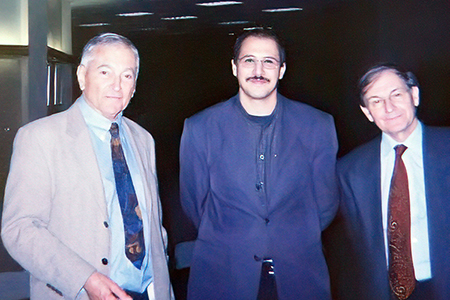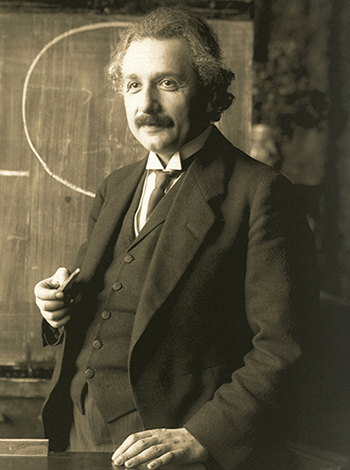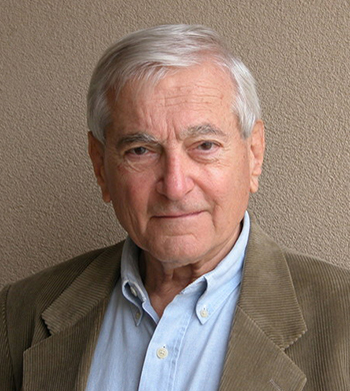
Sir Roger Penrose, the British scholar who won half of the 2020 Nobel Prize in physics “for the discovery that black hole formation is a robust prediction of the general theory of relativity,” gave a transatlantic talk over Zoom on Sept. 2, 2021, titled, “Spinors, Space-Time, and Working with Wolfgang Rindler.”
The Nobel laureate and the late UT Dallas physics professor Wolfgang Rindler, who was one of the most prominent experts in theoretical relativistic cosmology and general relativity, enjoyed a 2-year collaboration during the writing of their 2-volume work, “Spinors and Space-Time,” first published in 1984 by Cambridge University Press.
Rindler, whose research dealt with the origin, evolution and structure of the universe, was instrumental not only in the founding of the Department of Physics at UT Dallas, but also in the rise of scientific research at the University.

Rindler applied Albert Einstein’s general theory of relativity to the motion of the entire universe.
Early in his career, Rindler examined the concept of a “horizon” in cosmology, which in a 1956 paper he described as “a frontier between things observable and things unobservable.” In that article, he also coined the term “event horizon” to describe a boundary beyond which — due to the nature of space, time and the speed of light — events would be forever outside an observer’s view.
The textbook Penrose and Rindler wrote still is regarded as the most comprehensive and readable account of a powerful body of mathematical techniques, as applied to Albert Einstein’s general theory of relativity and other topics.
They described spinors, which are complex mathematical objects that don’t come back to themselves under 360-degree rotation but require 720 degrees. Spinors help describe the behavior of ordinary matter, like electrons and protons, and are used to model a range of problems in theoretical physics, including relativity and spacetime.
Dr. Anvar Zakhidov, professor of physics at UT Dallas who was involved in arranging Penrose’s lecture, said he first learned about the collaboration between the pair in the 1980s in Moscow, when he was trying to learn spinor physics and read their book, which had been translated into Russian.
“I never imagined then that I would become Wolfgang’s friend and colleague at UT Dallas for nearly 20 years,” Zakhidov said. “That scientific collaboration of two giants changed our current vision of the universe and its most unusual objects: black holes. It is amazing that black holes so elegantly justified by Penrose’s mathematics at extreme gravitation can also be independently described by the ‘Rindler Horizon’ concept at extreme acceleration.”
Despite Rindler passing away in February, 2019, at age 94, Penrose’s relationship with UT Dallas continues to this day.
UTD physics professor Mustapha Ishak-Boushaki said he interacted with Penrose during his Texas visits in 2006 and 2013. In 2013, they discussed Penrose’s most recent work, “Cycles of Time: An Extraordinary New Vision of the Universe.”


Ishak-Boushaki, a distinguished cosmologist and relativist, currently leads the cosmology and astrophysics group at UT Dallas.
Penrose gave a talk at the Texas Symposium on Relativistic Astrophysics in Dallas, which was organized in part by UT Dallas.
“We talked about cosmology and general relativity,” Ishak-Boushaki said.
“The current accepted scenario of cosmology is that there is a period of rapid expansion after the Big Bang called cosmic inflation. Then the universe expansion slows down, structures clusters of galaxies form, and then this is followed by a second (currently observed) period of cosmic accelerated expansion with dark energy.
“Penrose proposes another scenario of the universe with repeated cycles of acceleration and deceleration with a cosmological constant driving the acceleration instead of one single cycle,” Ishak-Boushaki said.
Help us leave the planet a better place for future generations. Your support for the School of Natural Sciences and Mathematics funds scientific discoveries with real-world applications, student and faculty recruitment, and academic scholarships.